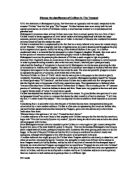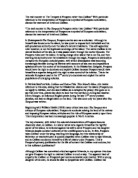Shakespeare’s motives for portraying the character of Caliban is such a negative light are probably stemmed from England’s stance on colonization at the time. Shakespeare had a tendency to write his plays in order to please the ruling monarch, who at the time was James I, who had just 4 years previously authorised the founding of Jamestown in the new world. Shakespeare can also be seen promoting the idea of colonisation in Anthony and Cleopatra. The ideals of colonisation were based on the belief that the white Europeans were superior to the coloured natives across the seas. The wise and powerful prospero is meant to represent the position of colonizer, and Caliban that of the native.
The name Caliban is a form of ‘Carib’ which was the name given to the people on the island originally invaded by Columbus. It is also almost an anagram of cannibal, Shakespeare probably based The Tempest on Montaigne's essay "Of Cannibals", and this makes Caliban easily associated with the ‘savage natives’ that the English were in the process of inflicting imperialism upon. This representation is furthered when Trinculo talks about how Caliban would fetch a fortune back in Napals. This is alluding to the 16th centaury practice of ‘exhibiting’ American Indians at shows and fairs. These were very popular at the time and were a regular feature under of James I’s colonization agenda.
Caliban has absorbed the obedient attitude of a slave to his master. He gives Stefano the qualities of a ruler and proposes himself as a slave in a manner that shows the ideal mentality of servile character. “I will kiss thy foot. I’ll swear myself thy subject.” This line depicted Caliban as unable to think beyond his colonized roll.
Considering this it is somewhat ironic that the part of Caliban has also been interoperated as being anti colonization by a more modern audience. Caliban is often seen as representing the American Indians who, just and Caliban assisted and was then betrayed by Prospero, gave aid to the settlers only to have there lands taken form them.
“Showed thee all the qualities o’ th’ isle,”-“Cursed be that I did so!”
A modern audience is far more likely to feel empathy with Caliban owing to the fact that the Isle was his to begin with “This isle’s mine by Sycorax my mother”, Sycorax being the which who was exiled to the island whilst pregnant with Caliban.
Since Shakespeare almost certainly intended to paint Caliban in a very negative light it seems strange that he gave him some of the most beautiful poetry in the play. This may be because Shakespeare was trying to show a depth behind Caliban, perhaps to keep the early Jacobeans who were gaining prominence in society happy. At the end of the play Caliban realizes his folly in trying to overthrow his colonial master and apologizes, although what happens to him after this point is not portrayed in the play.
A modern audience also might gain pity for Caliban when Prospero seeks him out merely to abuse him, and when we see him tormented by spirits. However, this sympathy is made more difficult by his attempt to have Prospero brutally killed by Stefano, and by his lack of any kind of remorse for his attempted rape of Miranda, he claims that had Prospero not stopped him he would have “Propped the isle with little Calibans”
While there are many representatives of imperialism in the play, the colonized have only one representative which is Caliban, and this can be said by both a modern and by an Elizabethan audience to be his primary function, however to both audiences he portrays them in a different light.
822 words







